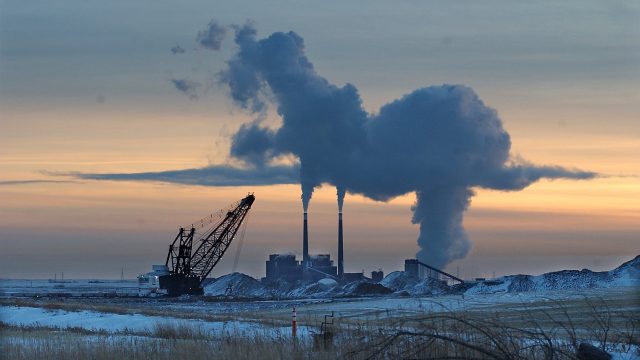Jason Bohrer: When It Comes To Coal The United States Needs To Lead

TOM STROMME/Tribune The dragline shovel Chief Ironsides works alongside highway 83 near the Great River Energy plant at Falkirk at sunset Wednesday.
This Administration’s “War on Coal” seems a misguided way to lead the world when it comes to tomorrow’s energy sources. Countries around the world are increasingly looking at coal because it is the cheapest source of fuel that can be used to produce low-cost electricity, a key component of a modern and progressive society. Rather than a “leave-it-in-the-ground” mantra, the United States would better be served by a focus on ensuring coal is used in the future with an eye toward capturing and using the carbon dioxide for beneficial purposes, including enhanced oil recovery.
Substantial research projects are well underway in certain parts of the United States – including North Dakota — to generate electricity from coal and capture carbon dioxide in a cost-effective way. Once proven, this technology can be shared with other countries who are turning to coal and away from other sources – namely nuclear and renewables. Germany and Japan are turning from nuclear because of the Fukushima disaster and other countries are expanding their coal generation because of the intermittency and high costs associated with renewables. Still others are building coal-based generation because their countries are starved for affordable power, and often coal deposits can be mined domestically.
[mks_pullquote align=”right” width=”300″ size=”24″ bg_color=”#ffffff” txt_color=”#000000″]The coal industry in North Dakota has the means to lead the way when it comes to carbon capture and storage, but we need to work together with the federal government itself on R&D initiatives. [/mks_pullquote]
The University of North Dakota’s Energy and Environmental Research Center, a world-recognized leader in carbon capture and storage technologies, is currently involved in multi-million dollar projects with several partners that are leading toward an electric industry that can both capture carbon dioxide and use it to increase oil production from existing, partially depleted oil fields.
The North Dakota coal industry formed a partnership with the State of North Dakota more than three decades ago to invest in research projects that would increase efficiency and reduce emissions at the state’s eight power plants and the nation’s only commercially-sized, coal-to-natural gas plant. Industry has invested more than $2 billion in clean coal technology in North Dakota alone. The result is people in North Dakota are breathing some of the cleanest air in the nation. North Dakota is one of only seven states to meet all federal ambient air quality standards, and the American Lung Association recently ranked Fargo and Bismarck among the top 10 places in the United States with the cleanest air.
The keys to the success of clean coal, then, is technology, research and development, and something a bit more intangible – partnerships. Currently, a partnership between the state, industry and researchers is promoting the development of a new technology, known as the Allam Cycle. This technology uses carbon dioxide in a high pressure and high temperature environment to spin turbines that generate electricity. The process is more efficient than steam as conventional plants do today. The Allam Cycle also produces a pure stream of carbon dioxide that can be pipelined to the oil fields in western North Dakota, and an existing CO2 pipeline already exists. The combination of resources and technology makes it possible for North Dakota to build new plants of the future with near zero emissions.
The coal industry in North Dakota has the means to lead the way when it comes to carbon capture and storage, but we need to work together with the federal government itself on R&D initiatives. Both time and money will be required if the dream of a power plant of tomorrow is going to be realized. If coal is going to remain a part of the ‘all of the above energy’ equation our nation so strongly touts, keep our electricity prices low, maintain our good-paying jobs right here in America, preserve our reliable energy and make sure our economic future stays strong, the federal government – namely the Environmental Protection Agency and the Department of Energy – need to understand that their cooperation and participation are required if the United States is going to be truly a leader.
We cannot give up on the future of coal. As our most prolific source of reliable, steady and affordable fuel, we need coal to keep our energy costs low, economies humming and baseload power available when we need it. It’s too easy to write coal off, but to do so would be eliminating what could be a distinctive and mutually beneficial technology that can be used domestically and abroad. We must all work together towards a future that makes use of all of natural resources, and coal must remain one of them.




